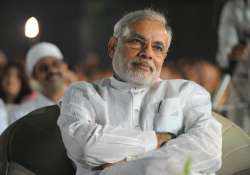œPM Modi's trip to be turning point in regional cooperation
Dhaka: Having resolved most of the irritants in ties, Bangladesh and India now need to give priority to sub-regional issues and Prime Minister Narendra Modi's visit should be seen as a “turning point” in regional cooperation,

Dhaka: Having resolved most of the irritants in ties, Bangladesh and India now need to give priority to sub-regional issues and Prime Minister Narendra Modi's visit should be seen as a “turning point” in regional cooperation, Premier Sheikh Hasina's foreign policy adviser said today.
“In recent years, the two countries have resolved virtually all bilateral issues and have embarked on ambitious cooperative projects and maximised benefits through sub-regional cooperation,” Hasina's International Affairs Adviser Professor Gowher Rizvi told PTI.
He said Bangladesh expects Modi's two-day visit, starting Saturday, to elevate bilateral relations to a higher level and also push for greater priority to sub-regional issues of common interest.
“So we are very much looking forward to welcoming him. This gives us an opportunity to build on the extraordinary close cooperative relationship that the two countries developed over the past six years,” said Rizvi.
He said with the conclusion of the landmark Land Boundary Agreement (LBA) that was one of the last outstanding issues, “now the time has come to go forward and tackle bigger bilateral and sub-regional or trilateral issues, where much of our hopes lies.”
Rizvi said having “greater grasp of regional relations and particularly of Indo-Bangla ties,” Modi had showed the importance he attaches to regional issues from the day of his inauguration by inviting South Asian heads of government. “Since then he has reached out to all the SAARC neighbours and his emphasis on the region is fully shared by his counterpart,” Rizvi said.
“The visit should be seen as a turning point in regional cooperation as well,” he said. Asked for comments on the outstanding Teesta water sharing issue, Rizvi said “of course, there remains the issue of Teesta, which is causing some anxieties in the minds of the people...but again Bangladesh government remains very confident (about resolving the problem).”
He termed the Teesta issue “a shared problem”, saying it was “not about India and Bangladesh, it is about people, whose livelihood depends on the river” and both sides have already “raised the issue to a higher humanitarian level.” “Of course there are not enough waters to meet everybody's demand, but certainly there is enough for everybody's need,” Rizvi said.
He recalled that ahead of the last minute postponement of the deal in 2011, “we did find a very fine acceptable formula which was initiated at the official level.” External Affairs Minister Sushma Swaraj this week ruled out the possibility of signing the Teesta treaty during Modi's visit but Rizvi said the agreement would be signed “before too long”.
Talking about the LBA, Rizvi said it was an issue that had remained unresolved since 1947 and defied solutions “but with goodwill and sincerity even that most complicated issue was solved to the benefit of both countries”
“The agreement is going to have a direct impact on the lives of people who have long been suffering in the enclaves. Relationships become more important when we understand their significance and when benefits accrue to common people,” said Rizvi, a former professor of public policy and international affairs at Oxford and Harvard Kennedy School.
“The settlement in the enclaves and the ending of the cross-border infiltration of terrorists will bring enormous benefits to the people of both countries,” Rizvi asserted.
He said the Bangladesh Premier put the connectivity issue at the core of her regional agenda and so “it is probable that the two PMs will also pick up the stalled issue of transit during their upcoming meeting.”
“How to make connectivity a reality by developing transport infrastructure—river, rail and road—will feature prominently in their talks,” Rizvi said. The Premier's adviser said after the resolution of the long-standing maritime dispute, “it is natural that the two PMs will now engage in exploring ‘blue water economy' in the Bay of Bengal.”
With respect to Bangladesh's domestic issues, Rizvi said, the visit was also significant as ex-premier Khaleda Zia's Bangladesh Nationalist Party (BNP) of late “has fortunately retracted from its earlier anti-Indian stance.”
“While historically they have bitterly criticised our (ruling Awami League) ties with India, in most areas, today they now share our (Bangladesh) government position vis-a-vis India,” he said and expressed hope that “it will enable us to develop a bipartisan stance of foreign policy issues.”
Asked what impediments were still there in the way of bilateral ties and what scope was there for Modi's visit to contribute to ties, Rizvi said, “I think it is important to separate the myths and prejudices from the reality through informed discourse and discussion of our bilateral relations and judge the outcomes based on our national interests.”
“The reality is that India is Bangladesh's most important neighbour and partner. Shared history, shared culture, and geography have linked the two countries and no one in Bangladesh would ever forget India's help in 1971 when Indian soldiers fought shoulder to shoulder with our freedom fighters,” Rizvi said.
“But small irritations often create problems and sour relations but together we have been able to solve all outstanding issues,” he said. Talking about avenues in expanding trade ties, Rizvi said opening up of Indian markets and duty free and unrestrictive access to Indian market created opportunity for our businessmen “who for years were asking for it but not getting it”.